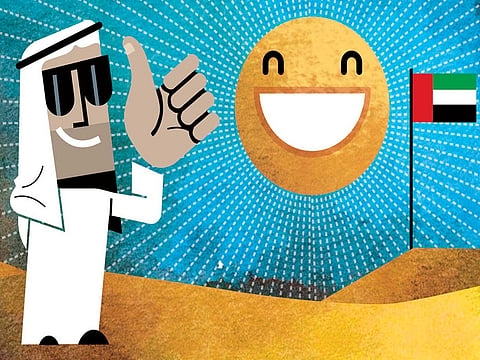Happiness is the elixir of a good life
Most Emiratis can’t help but smile when they hear that the UAE is in the top 20 happiest nations in the world

The other day my friend and I were enthusiastically discussing happiness and ways of increasing this rare, elusive sentiment so that it wraps us around its radiant halo. We discussed the vast array of self-improvement books on the market, the latest motivational speakers on YouTube, and our own social experiments with all these agony aunts’ advice.
Overall, it’s had a remarkable effect on the quality of our lives and so we’re not the only ones loving this new happiness movement, but it seems the world is, too, in love with creating happier societies. Did you know that Harvard’s Positive Psychology course is the most popular course in the history of Harvard University?
“So what makes you happy?” asked my friend amusingly. That’s easy – it’s always been my family and closest friends, my daughter’s antics, beautiful literature, nature, and gazing at gorgeous getaways on Pinterest. She shared a similar listing (it’s no wonder we’re best friends).
Most of us don’t need a definition for happiness – we know it when we feel it and sometimes we feel we can’t get enough of it as we would like to.
However, happiness or subjective well-being is not a fluffy, new-age concept as most naysayers would sardonically spew. It is real and leaders around the globe are very much interested in understanding and promoting their citizens’ well-being.
In fact, I could boldly advocate that it’s every person’s right to be happy as I can easily cite the United Nations 2011 resolution which affirms that “the pursuit of happiness is a fundamental human goal”.
It’s why I’m thrilled that the UAE Federal Government has recently appointed a Minister for Happiness. Working as a civil servant for the past decade, I have enjoyed working for a government that is relentless at making happiness a national policy priority.
You might all recall, for example, the letter of His Highness Shaikh Mohammad Bin Rashid Al Maktoum, Vice-President and Prime Minister of the UAE and Ruler of Dubai, to the Federal Government employees pressing them to provide world class services to the people of the UAE with the goal of contributing to their happiness.
Other than the utopian goal of promoting happiness, there is growing scientific evid-ence proving that happiness is beneficial to the functioning of a nation. To name a few benefits, well designed happiness policies can result in improved academic performance, higher work productivity, better health outcomes, fulfilling relationships, fewer crimes, and better life decisions – ultimately translating in gained revenues or reduced cost burdens for the public sector.
For example, promoting children’s well-being at school can lead to higher academic attainment rates in addition to improved student behaviour.
Also, research by the University of Warwick reveals that happy people were around 12 per cent more productive. Not only that, an article published in the Journal of Applied Psychology concluded from over 160 studies that there is “clear and compelling evidence that happier people have better overall health and live longer than their less happy peers”. A quick research on the positive effects of happiness will unveil more fascinating insights.
Measures of progress
All these benefits have sparked an interest in policymakers and leaders, who are now advocating measures of progress to be based on happiness and well-being, and not just economic factors, such as gross national product growth.
In his moving speech made at the University of Kansas in 1968, Robert F. Kennedy highlighted the limitations of measuring a country’s well-being based merely on GDP: “The gross national product does not allow for the health of our children, the quality of their education or the joy of their play. It does not include the beauty of our poetry or the strength of our marriages, the intelligence of our public debate or the integrity of our public officials… it measures everything in short, except that which makes life worthwhile.”
The fascinating question to ask now is: what should we expect from policymakers in terms of a happiness policy?
Conducting a survey to investigate what makes people happy could be the first step. Then, essential programmes and services should be designed to maximise happiness at each life stage or event from early childhood to adulthood and old age.
For example, the experts at the OECD assert that governments could start measuring quality of life in various dimensions some of which include: education and skills; employment; income; housing; health; work-life balance; social connections; and civic engagement. In essence, public policies should result in creating the conditions so that people do more of what makes them happy; ultimately creating value for themselves and others.
Most Emiratis can’t help but smile when they hear that the UAE is in the top 20 happiest nations in the world. With the government’s committed strategy towards a happier society, I am sure we will reach the number one spot in no time.
Sara Al Mulla is an Emirati civil servant focusing on human development policy and children’s literature.



